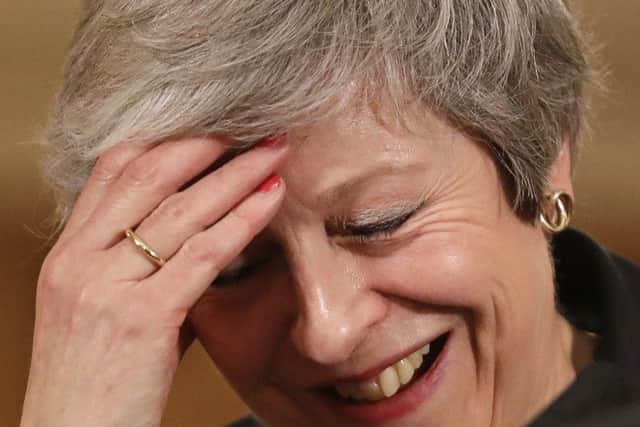Chris Burn: After dramatic week, not even Mr Blobby can predict Brexit outcome
The exchange on BBC Breakfast, which ended with Mason wryly suggesting the presenters may as well ask for the opinion of Mr Blobby “because frankly I suspect his is now as good as mine”, swiftly went viral as it resonated with the millions of people baffled and exasperated with the labyrinthine process involved in removing the United Kingdom from the European Union.
His assessment on Monday morning that the events of the coming days were impossible to predict was swiftly vindicated.
Advertisement
Hide AdAdvertisement
Hide AdFollowing thousands of hours of negotiations since Article 50 was triggered in March 2017, it was announced on Tuesday that a technical deal had at last been agreed on the terms of the Brexit withdrawal agreement. While the precise details were not made public, leading Brexiteers swiftly denounced it as leaving the UK as facing the prospect of “colonial rule from Brussels” on the grounds Britain would have to accept EU rules and regulations for years to come while having no say in their formation.
On Wednesday, Theresa May secured the backing of her Cabinet – but only after an intense five-hour meeting, reportedly involving shouted rows, tears and a grim warning from Health Secretary Matt Hancock that “he could not guarantee that people would not die” in the event of a no-deal Brexit that impeded NHS access to vital supplies and medicine.
Mrs May eventually emerged from 10 Downing Street to tell the nation that the Cabinet’s agreement had been secured in what she claimed would be “a decisive step which enables us to move on and finalise the deal in the days ahead”. She said three choices now lay ahead; her deal, no deal or no Brexit at all.
But behind the black door of No 10, Brexit Secretary Dominic Raab had already resolved to quit after seeing the fine detail of the near-600 page agreement and feeling undermined by what had been agreed without his approval. He resigned just before 9am the following morning, sparking an extraordinary day of political drama which had some believing the Prime Minister was about to resign by the time she held an early-evening press conference.
Advertisement
Hide AdAdvertisement
Hide AdIn seven paragraphs, Raab’s resignation letter concisely set out exactly what has so perturbed many Conservative Brexiteers; fears the planned regulatory regime for Northern Ireland “presents a very real threat to the integrity of the United Kingdom” and concerns that committing to a potentially indefinite stay in the custom unions would give the EU a veto over the UK’s eventual departure. “No democratic nation has ever signed up to be bound by such an extensive regime, imposed externally without any democratic control over the laws to be applied, nor the ability to decide to exit the arrangement,” he said.


Half an hour before Mrs May was to present her plans to MPs in Parliament, Raab’s resignation was followed by that of Work and Pensions Secretary Esther McVey, who bluntly said the deal “does not honour the result of the referendum”.
Mrs May then headed to the House of Commons where she was told repeatedly by Brexiteers unhappy at a perceived loss of sovereignty and Remainers calling for a second referendum that her deal would not be voted through.
As she was coming to the end of three gruelling hours of questioning, Jacob Rees-Mogg held a press conference on the very spot where Mrs May had been confirmed as the new Prime Minister two-and-half-years ago. He announced, to the surprise of no one, he was submitting a letter of no confidence in the hope of triggering a leadership contest.
Advertisement
Hide AdAdvertisement
Hide AdWith growing uncertainty about whether more Cabinet ministers would resign – and reports Michael Gove had turned down an offer to be Brexit Secretary – the Prime Minister called a press conference for 5pm. As she started by reflecting in a valedictory manner of the honour, privilege and heavy responsibility of serving in high office, as well as her determination to act in the national interest, it seemed more than possible that a resignation was imminent.
But instead, she invoked the spirit of her sporting hero Geoffrey Boycott to insist she was determined to see the job through and reiterating, once again, that her deal is the only one on the table. Mrs May’s calculation that MPs will eventually fall into line and vote through her plan rather than effectively allowing the country to fall into the nightmare no deal scenario is both a high-risk strategy and the only real option left available given the EU is clear it has no interest in reopening negotiations with Mrs May or anyone else.
Her position was strengthened yesterday as Gove and other Cabinet ministers agreed to stay, but as the letters of no confidence in Mrs May from Conservative backbenchers continue to pile up, it is clear the febrile political atmosphere that followed both the 2016 referendum vote and the 2017 general election has returned.
The difference between now and then is that on those occasions the turbulence came from the fallout to decisive moments, whereas now the key decisions still lie ahead. What is clear is that the UK is in for a bumpy ride in the few months ahead that are likely to define the nation’s future for generations to come. But whether it will be Mrs May’s deal, no deal or no Brexit cannot be predicted with certainty by anyone – even Mr Blobby.